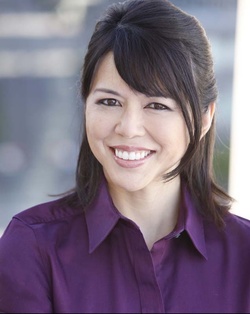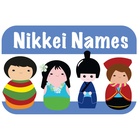I grew up hating my name. I wanted to change it to “Amy.” Amy sounds cute and it sounds white, and I wanted to be both. All my friends and Barbie dolls were white, and I wanted to match. I remember having an aching feeling at 7 years old, wishing with all my might that I could change my name. Not surprisingly, when I approached my parents with the idea, they laughed.
I was the third of four kids in my family, born in 1960’s suburban New Jersey, with no other Asian family in sight. My parents gave me a Japanese name, just as they had for my two older sisters. Being a scientist, my dad created a methodical way to name his children. He wrote out all the hiragana (Japanese phonetic characters) on paper and cut them into separate pieces. Then he and my mom scrambled them until they came up with a name they liked.
They named their long awaited son Kenichi. He always went by “Ken.” I was so jealous that he got an American sounding name! One day Ken came home with a silhouette portrait of himself that he made in his 4th grade art class. He told my mom that he protested when the art teacher forced him to write “Kenneth” at the bottom of the picture in bold letters. She made an incorrect assumption that his name was short for Kenneth. I was scared by how furious she was.
My parents, who both grew up in Japan, originally picked the name “Nana” for me. They wanted Japanese names for their kids that would be easy for Americans to pronounce. Their American friends told them Nana was not a good name because everyone would be expecting me to be an old granny, which may have made for some confusing moments—”Nana sleeps in a crib” and “Nana loves dancing in her tutu!”
They settled on Yumi. I cringe when people ask me what it means. The characters translate to “good” and “beautiful.” This puts an awkward pressure on those who ask me the meaning to say, “Oh, uh…yes! You are true to your name.” My usual response is to avert my gaze and half-heartedly mumble “thank you,” as I’m too uncomfortable to claim those traits.
That is another reason why I wanted to be Amy. Not only was there one syllable separating me from being an outsider and being like everyone else, but Amy means “beloved,” so that name doesn’t carry the burden of having to feel or act a certain way. It means others would love me even if I was bad and ugly!
My parents chose my name with the best of intentions. They wanted me to remember where they came from, and I do. However, they did not foresee that choosing a Japanese name could further alienate me from my own country. Also, having come of age in World War II Japan, their family culture focused on survival and accomplishment, and not on feelings, so these things were never discussed.
My name has helped shape who I am. From middle school through high school I became skilled at pretending I felt as worthy as others, even through the subtle racism and not so subtle taunts. Feeling different motivated me to strive for popularity and accomplishment. Yes I compromised my own truth to fit in, but there were some lessons learned—I could withstand adversity and achieve goals. Most importantly I learned that fitting in is a shallow victory, and I do not look good in preppy clothes.
In college it became a mission for me to find out who I was. I studied Japanese language and history. In fact I ended up majoring in Japanese and spent seven eye opening months in Japan junior year. I had a physical connection with the Japanese, but I learned there that I was truly an American on the inside.
Now that I live in a place where I can’t throw a stone without hitting another Asian, I don’t feel like an outsider. Racism is still rampant where I attended middle and high school in Rumson, New Jersey. A few years ago, my half Japanese niece was pulled over by a cop who barked at her patronizingly, “DO—YOU—SPEAK—ENGLISH?!”
Because of my past, I question having married a white guy, and having two kids with English and Celtic first names. All I can say is I married a person, and not a race. My kids play taiko and study Japanese, and devour hamburgers and ramen with equal gusto. They embrace their Japanese heritage, as well as their Japanese middle names.
I have made close female Nikkei friends, most with common American names, who had very different experiences growing up surrounded by other Asians. They have an innate confidence that I admire, and are a lot cooler than I am. These supportive friendships, coupled with unconditional love from my husband and children, have inspired me to work at being OK with who I am, inside and out. I have made peace with Yumi now, as long as you don’t ask me what it means.
© 2014 Yumi Iwama




